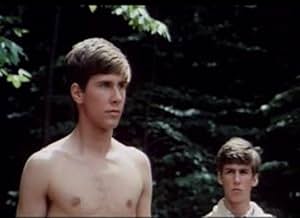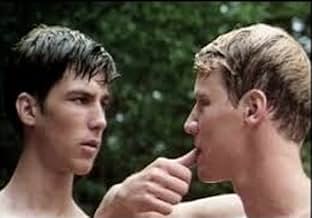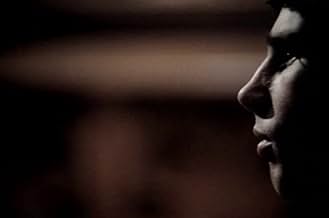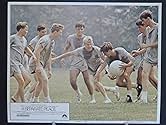Füge eine Handlung in deiner Sprache hinzuTwo roomates at a prep school in New England during World War II come to grips with the war, jealousy and betrayal. Based on a novel by John Knowles.Two roomates at a prep school in New England during World War II come to grips with the war, jealousy and betrayal. Based on a novel by John Knowles.Two roomates at a prep school in New England during World War II come to grips with the war, jealousy and betrayal. Based on a novel by John Knowles.
- Regie
- Drehbuch
- Hauptbesetzung
Falko Schilling
- Student
- (Nicht genannt)
Steve Walker
- Student
- (Nicht genannt)
Empfohlene Bewertungen
The novel A SEPARATE PEACE is one of the benchmarks of American adolescent literature, second only to CATCHER IN THE RYE in terms of an accurate portrayal of 20th century young adult angst. The novel is a complex, ambivalent portrayal of friendship between two dissimalar friends at a stuffy New England boys' school during the opening years of WWII. The film version captures to a great extent the feel of the era and the New England setting, yet fails to really convey the conflicted feelings of Gene, the narrator in the book. The all-important scene in the tree is rendered in a murky manner; one not famililar with the book would be confused as to what had happened. And the confrontation scene in Phinney's house is poorly staged and interpreted. It's interesting to note that, with the exception of Parker Stevenson, none of these actors seem to have made good in their respective careers. Begs for a quality remake.
"A Separate Peace," in novel form, is a nicely paced story filled with deep, sometimes complex metaphors and symbols. It is not for the reader who prefers the path of least resistance; the majority of enjoyment in reading the book is in the process of decoding the story. But that's what book-to-film renditions are for, right? "A Separate Peace," in movie form, is not such a far cry from the book as far as storyline goes. Instead, it follows the key points of the story while ignoring additional details that would create depth within the novel. In essence, streamlining the content of the novel. Much like in Peter Jackson's "Lord of the Rings Trilogy" adaptation, "A Separate Peace" is short, sweet, and to the point.
Being from the early 70's, this movie should not be expected to have the "best" visuals. For what it is, the cinematography does a fantastic job of illustrating what was conjured into my mind as I read the book. As does the acting, which is remarkable- actual Devon (the school in which the story is set) students and faculty were casted for leading and supporting roles in the movie.
I personally found this movie both entertaining and well adapted in relation to the novel. I'd say that it is definitely worth watching for anybody who has read, is currently reading, or plans to read "A Separate Peace".
Being from the early 70's, this movie should not be expected to have the "best" visuals. For what it is, the cinematography does a fantastic job of illustrating what was conjured into my mind as I read the book. As does the acting, which is remarkable- actual Devon (the school in which the story is set) students and faculty were casted for leading and supporting roles in the movie.
I personally found this movie both entertaining and well adapted in relation to the novel. I'd say that it is definitely worth watching for anybody who has read, is currently reading, or plans to read "A Separate Peace".
The 1972 film version of John Knowles modern masterpiece is a class act for the reason that Paramount Pictures went to Phillips Exeter Academy and filmed it on location with all student actors from Exeter with the exception of Parker Stevenson whom attended The Brooks School. Though the acting is a little amateurish,so what,it should be, for it is the drama society of the school and alumni putting on a Paramount Film!
John Heyl,a former Exeter Student, was eighteen and son of the school's doctor. John Heyl does a great job as Finny at the age sixteen,seventeen that Finny would have been in the novel. This was also Parker Stevenson, at eighteen, his first film and in my view his best role as Gene.
It is a good adaptation of the book but I would strongly suggest that you read the novel first for the tensions of love, hate,jealously, denial, sexual undertone, and regret are pale compared to John Knowles' writing.
It is a love story with war looming closer to the boys of The Devon Academy. The viewer decides if this love is emotional and / or physical. What else could motivate ones "Best Pal" and roommate to do such a violent act as to attempt to maim him hence excorise him (Finny) from Genes life i.e. emotions so deep that Gene could not deal with at sixteen.
I have recently viewed Showtime's 2004 version which was filmed at a college in Canada and has actors that are in there late twenties playing the parts of teenagers. No sorry - Veto! John Heyl will always be Finny and Parker Stevenson will always be Gene. The 1972 film version shot at Exeter is the true "Preppy Classic".
John Heyl,a former Exeter Student, was eighteen and son of the school's doctor. John Heyl does a great job as Finny at the age sixteen,seventeen that Finny would have been in the novel. This was also Parker Stevenson, at eighteen, his first film and in my view his best role as Gene.
It is a good adaptation of the book but I would strongly suggest that you read the novel first for the tensions of love, hate,jealously, denial, sexual undertone, and regret are pale compared to John Knowles' writing.
It is a love story with war looming closer to the boys of The Devon Academy. The viewer decides if this love is emotional and / or physical. What else could motivate ones "Best Pal" and roommate to do such a violent act as to attempt to maim him hence excorise him (Finny) from Genes life i.e. emotions so deep that Gene could not deal with at sixteen.
I have recently viewed Showtime's 2004 version which was filmed at a college in Canada and has actors that are in there late twenties playing the parts of teenagers. No sorry - Veto! John Heyl will always be Finny and Parker Stevenson will always be Gene. The 1972 film version shot at Exeter is the true "Preppy Classic".
The many negative comments on this elegant tale of the rites of adolescent angst insisted I watch again to see what they are talking about. These are teenagers so their actions aren't obliged to make sense. The pregnant pauses and alleged poor acting is awkward emotional teenage behavior mildly obscured because they're bright, articulate kids with lots of rivalries - but there is more going on here.
No one has even mentioned the emotional range of the very powerful snow-shoveling scene euphoria to unutterable sadness, screaming to silence: terrified kids. While the war is symbolic for the emotional swings of the children throughout the film it is very much less important as an influence.
Thematically what no reviewer seems to see here is the love story which foments the jealous, insecure, blind, ignorant savage underneath', illogical urge to strike out. When you don't know what else to do somebody's going to get hurt: these are scared, hormonal, vulnerable, lonely, forty's boys and coming out just isn't done.
Worse still - it may be unrequited love - even though it's just you and me buddy', and I'm good for you' and the beach is where you don't just come with anybody' and Finny's got himself and Gene undressed down to their underwear every chance he gets. Confusion reigns supreme afterward in the dorm when Gene - hasn't been the same since the beach' - and he's worried about something' unrevealed. And again later when he's wearing Finny's clothes and then again when he's stuttering on the phone.
Consider the reaction devastation when Finny thinks Gene might enlist and the ode to friendship that is the Winter Carnival where Gene wins all the gold - after training for the Olympics'. These boys are experiencing feelings which are strong and bubbling over all the time and they have no experience to cope with them.
The confession deals marvelously with the ethical problem of the selfish, sociopathic moment the stupid impulse the temporary insanity, when everything was changed forever, but in tears stops just short of Gene telling Finny he loves him. Then again in the hospital - a confession and forgiveness, but no relief from what the lad cannot express: there is no unraveling, no spilling his guts and no moment of truth.
Years later, all the fear and anger returned' - there is no peace, ever.
No one has even mentioned the emotional range of the very powerful snow-shoveling scene euphoria to unutterable sadness, screaming to silence: terrified kids. While the war is symbolic for the emotional swings of the children throughout the film it is very much less important as an influence.
Thematically what no reviewer seems to see here is the love story which foments the jealous, insecure, blind, ignorant savage underneath', illogical urge to strike out. When you don't know what else to do somebody's going to get hurt: these are scared, hormonal, vulnerable, lonely, forty's boys and coming out just isn't done.
Worse still - it may be unrequited love - even though it's just you and me buddy', and I'm good for you' and the beach is where you don't just come with anybody' and Finny's got himself and Gene undressed down to their underwear every chance he gets. Confusion reigns supreme afterward in the dorm when Gene - hasn't been the same since the beach' - and he's worried about something' unrevealed. And again later when he's wearing Finny's clothes and then again when he's stuttering on the phone.
Consider the reaction devastation when Finny thinks Gene might enlist and the ode to friendship that is the Winter Carnival where Gene wins all the gold - after training for the Olympics'. These boys are experiencing feelings which are strong and bubbling over all the time and they have no experience to cope with them.
The confession deals marvelously with the ethical problem of the selfish, sociopathic moment the stupid impulse the temporary insanity, when everything was changed forever, but in tears stops just short of Gene telling Finny he loves him. Then again in the hospital - a confession and forgiveness, but no relief from what the lad cannot express: there is no unraveling, no spilling his guts and no moment of truth.
Years later, all the fear and anger returned' - there is no peace, ever.
Many years after graduating college in New Hampshire in 1942, a nostalgic man revisits the campus of his alma mater in the off-season and reminisces about his roommate, a gregarious and reckless lad who goaded his friends into living for the day, breaking the rules and--most especially--jumping out of a tall tree into the lake below. Overlooked film version of John Knowles' semi-autobiographical novel (which, in turn, was expanded from his short story "Phineas") has a deeply personal feel even on the screen. While Knowles denied any homoerotic undercurrents in the text, those who do sense an attraction between the roommates, played here by John Heyl and Parker Stevenson, are bound to be the film's biggest admirers (when the novel is discussed in schools, it is said that homosexuality is never brought up in class, yet that hasn't stopped some schools from banning the book). There's a lovely simplicity--and, conversely, an unspoken complexity--in the friendship between the young men, which screenwriter Fred Segal cautiously, carefully tiptoes through (which is better than being tiptoed around). Director Larry Peerce works well with his actors, most of them non-professionals, and shows a keen, stylish eye for the period (surprising, since Peerce at this point had not shown much sensitivity). Not a hit with audiences, the picture grossed just under $1M at the US box office and was promptly forgotten, but it has a special sort of gleam. **1/2 from ****
Wusstest du schon
- WissenswertesThe scene where the boys all suddenly start singing "Hitler has only got one ball" was unscripted. Director Larry Peerce continued filming to see how it played out, with the scene ending up in the final cut.
Top-Auswahl
Melde dich zum Bewerten an und greife auf die Watchlist für personalisierte Empfehlungen zu.
- How long is A Separate Peace?Powered by Alexa
Details
Box Office
- Bruttoertrag in den USA und Kanada
- 921.268 $
- Laufzeit1 Stunde 44 Minuten
- Sound-Mix
Zu dieser Seite beitragen
Bearbeitung vorschlagen oder fehlenden Inhalt hinzufügen






















